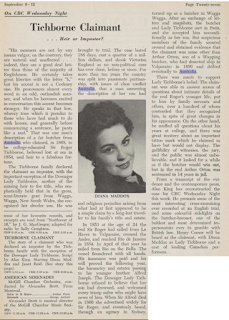Mini series from ATN-7. 26 eps x 30 mins. Written by John Abbott, Edward Hepple, Jonh Kiddell, Michael Wright. Directed by Jacques d Vigne.
Premise
Tolly McCall is the lightweight boxing champion of Australia whose career is threatened with injury. His wife Janet is relieved that he will no longer box. Tolly becomes obsessed with a young aboriginal boxer, Wayne.
Cast
- Mark McManus as Tolly McCall
- Carmen Duncan as his wife Janet
- Vincent Gil as Wayne Small, an aboriginal boxer
- Jannice Dinnen
- Gordon Glenwright as Tolly's manager, Bongo Byrne
- Janice Dinnen as Donna McCall
- John Armstrong as Tolly's trainer, Monk
- Les Foxcroft
- Lucky Grills
- Bill Hunter
Production
It followed the production of You Can't See Round Corners. It was originally known as The Doongara Kid.
The story was inspired by Lionel Rose.
Vincent Gil was trained in boxing for the serial by Bill McConnell.
It was shot at ATN's studio in Epping, Sydney and on location at Le Perouse, the stadium, and travelling tent shows
Episode Guide
- Ep 1–26 June (Sydney), 9 July (Melbourne) - Tolly is told he cannot fight again. He goes to the country to think things over. While there he discovers his Aboriginal partner on a log cutting job is an excellent fighter. Tolly decides to train him.
- Ep 2–3 July (Sydney), 16 July (Melbourne) - written by John Kiddle and Edward Hepple - Tolly and his wife disagree on their future plans and all depends on Wayne's first fight.
- Ep 3–10 July (Sydney), 23 July (Melbourne) - in an effort to get Tolly back to Sydney, Janet offers to help two of his friends set up a gym.
- Ep 4–17 July (Sydney), 30 July (Melbourne) - Bondo and Monk have found a gym and start negotiations. When Tolly and Wayne arrive in a small bush town to fight the local championship they land in trouble due to the attitude of local citizens toward Aboriginals.
- Ep 5–24 July (Sydney), 5 August (Melbourne) - Wayne and Tolly are tried in the magistrate's court for assault and fined accordingly. Tolly's younger sister sets out to make an issue of Wayne's imprisonment.
- Ep 6–31 July (Sydney), 12 August (Melbourne) - Janet heads for the country town where Tolly is imprisoned in an attempt to heal the breach between them. Tolley's wife Janet arrives but she will not pay the fine.
- Ep 7–7 August (Sydney), 19 August (Melbourne) - things get better between Janet and Tolly until he discovers she is working for her old lover, Halliday. Wayne starts training but disappears after overhearing a fight between Janet and Tolly.
- Ep 8–14 August (Sydney), 26 August (Melbourne) - the day of Wayne's first fight arrives and he is missing, distraught over the trouble he thinks he has caused between Janey and Tolly
- Ep 9–21 August (Sydney), 2 September (Melbourne) - Janet is still missing and Tolly is convinced she has left with Halliday
- Wayne hopes Tollly will change his mind about managing him and rejects Bongo's offer.
- Ep 10–28 August (Sydney), 9 September (Melbourne) - Tolly visits the doctor and finds out the fractures in his head will never heal
- Ep 11–4 September (Sydney) 16 September (Melbourne) - Tolly gets a job as a chauffeur, meets an attractive woman who recognises him and they become involved. Tolly goes to Paula Bradley's flat for dinner.
- Ep 12–11 September (Sydney), 23 September (Melbourne) - Wayne hopes that Tolly will change his mind about managing him and refuses Bongo's offer of management.
- Ep 13–18 September (Sydney) 30 September (Melbourne) - Wayne gets his first bout at the South Sydney Leagues Club. Tolly and Janet discuss matrimonial problems. Janet starts divorce proceedings.
- Ep 14–25 September (Sydney), 7 October (Melbourne) - Wayne hits the big time and starts earning a lot of money. Donna goes to work for the Herald and has to do a story on an English racing driver.
- Ep 15–1 October (Sydney), 14 October (Melbourne)
- Ep 16–8 October (Sydney), 21 October (Melbourne)
- Ep 17–15 October (Sydney), 28 October (Melbourne)
- Ep 18–23 October (Sydney), 4 November (Melbourne)
- Ep 19–5 November (Sydney), 11 November (Melbourne) - Monk's involvement with shady characters leads to unexpected developments.
- Ep 20–12 November (Sydney), 18 November (Melbourne)
- Ep 21–19 November (Sydney), 25 November (Melbourne) - Bongo and Tolly sign up a new lightweight from Melbourne.
- Ep 22–26 November (Sydney), 2 December (Melbourne) - Wayne starts going back into boxing by doing easy fights
- Ep 23–3 December (Sydney), 9 December (Melbourne) - written by John Abbott - Tolley is conned into a fashion parade and Wayne is conned back into gym work.
- Ep 24–10 December (Sydney), 16 December (Melbourne)
- Ep 25–17 December (Sydney), 23 December (Melbourne)
- Ep 26–24 December (Sydney), 30 December January (Melbourne) - final episode - Wayne vanishes after winning the Australian title
Reception
Reviewing the pilot episode The Age praised it as "exciting, sustaining, action viewing".
The Sydney Morning Herald felt the second episode "felt tired" and that the writers "were not at home with women".
In July the Sydney Morning Herald called it "television drama less derivative than any Australian series so far" but said Gill "is given little to articulate about being aboriginal. To begin with, he looks white and in the hands of white writers his characterisation is robbed of perception."
In December the Sydney Morning Herald said "the show has not delivered a knock out" blaming poor writing
 |
| The Age 11 July 1968 |
 |
| SMH 16 June 1968 |
 |
| The Age 4 July 1968 |
 |
| SMH 4 May 1968 |
 |
| SMH 4 Dec 1968 |
 |
| SMH 25 July 1968 |
 |
| SMH 4 July 1968 |
 |
| SMH 26 Jun 1968 |
 |
 |











